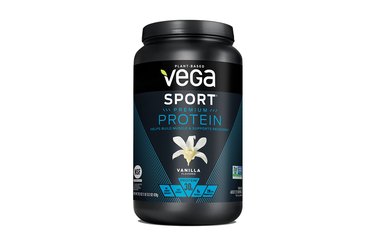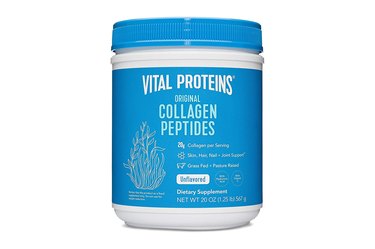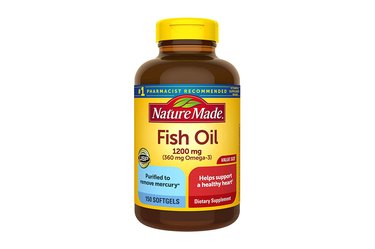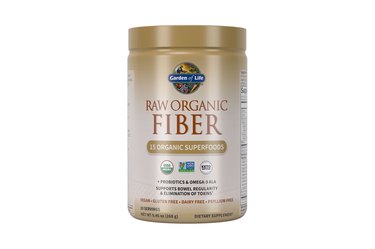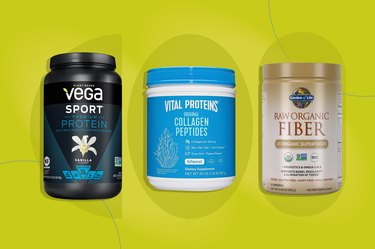
The menisci, two boomerang-shaped discs that help cushion the knee, are pieces of our anatomy that we typically forget about — until you tear one. Indeed, these shock-absorbers are essential for stabilizing the knee, so damaging one can seriously affect your mobility and quality of life.
The road to recovery after meniscus repair can feel long, but following the orders of your health care team can help get you back to normal movement quicker. Your providers may also recommend making sure your diet is optimal for healing. If you're not sure where to start with your diet, below are some nutrients that will keep your body healthy and may help with tissue repair.
Video of the Day
Video of the Day
Keep in mind that you don't necessarily need to take a supplement. Whole foods should always be your first choice when it comes to nutrition. But if your nutrient needs can't be met with diet, supplements can help fill the gaps.
How We Choose
We tapped sports dietitian Marie Spano and combed through the research to assemble our list of the best supplements for meniscus repair. The specific products we recommend below all have a seal of approval from a third-party testing lab that monitors supplements for safety and efficacy and/or meet the FDA's standards for current good manufacturing practices.
1. Protein
After surgery, it is essential that you preserve your muscle mass while on the road to recovery, and getting enough protein will be instrumental in that. It has been widely noted that to help prevent muscle wasting, your protein intake needs to be higher, according to August 2020 research in Nutrients.
The recommendation for protein during the rehabilitation phase is 2 grams per kilogram of body weight per day. (This is more than the recommended daily allowance (RDA) of 0.8 grams.)
Here's how to calculate those increased needs for your body:
- Take your body weight in pounds and divide by 2.2 to get your weight in kilograms. For example, 150 pounds equals 68 kilograms.
- Multiply your weight in kilograms by 2 to get your daily grams of protein. For example, someone who weighs 68 kilograms should get 136 grams of protein each day.
You want to ensure you break up your protein throughout multiple meals and snacks, as this helps your body absorb it better. If you're not sure you can get that much protein from food, that's where supplements come in.
If you do not have any dietary restrictions, whey protein is an optimal choice when choosing a protein supplement for recovery. It is rich in leucine, an amino acid that's key in keeping your muscles from breaking down, according to the Nutrients research. However, if you follow a plant-based diet, there are many protein powders that can help you reach your protein goal.
- Garden of Life NSF Certified for Sport Whey Protein Isolate: $39.89 for 20 servings; Amazon.com
- Vega Sport Premium Plant Based Protein Powder: $49.99 for 20 servings; MyVega.com
2. Collagen + Vitamin C
Spano suggests collagen plus a source of vitamin C for cartilage repair. She notes "both collagen hydrolysates and undenatured collagen (regardless of source or molecular weight) help reduce cartilage destruction or promote cartilage repair."
It still isn't clear how collagen works, Spano adds, "though the research to date suggests collagen supplements may work in one of three ways: Stimulate cartilage cells to synthesize collagen, inhibit the death of healthy cartilage cells and the peptides in collagen supplements may serve as the building blocks for cartilage."
The International Olympic Committee (IOC) endorses collagen and gelatin (made from collagen) plus vitamin C for injury recovery and increased collagen production, according to their 2018 consensus statement in the British Journal of Sports Medicine. Vitamin C has been linked to promoting collagen synthesis (building) and tissue healing.
The National Institutes of Health notes that the menisci are made up of 70 percent collagen, and while the research is still emerging, supplemental collagen is a low-risk supplement that may help with recovery.
The IOC recommends either 5 to 15 grams of gelatin or 10 grams of collagen per day, plus at least 50 milligrams of vitamin C. Spano suggests sticking with less than 1,000 milligrams of vitamin C.
- Vital Proteins Collagen Peptides Powder: $39.99 for 28 servings; Amazon.com
- Puritan's Pride Hydrolyzed Collagen: $12.66 for 45 servings; Amazon.com
3. Omega-3 Fatty Acids
Omega-3 fatty acid supplementation is often recommended for a variety of conditions. There are a couple of reasons this type of supplement may be beneficial if you are recovering from a meniscus repair.
The first is emerging research that suggests omega-3 supplementation can help reduce the amount of muscle lost after exercise. In a January 2019 study in The FASEB Journal, a group of young women had one leg immobilized for two weeks. Those who took omega-3 fatty acids had significantly less muscle loss than those who took a placebo.
The second is the established role of omega-3s in reducing inflammation. The inflammatory process immediately after surgery is necessary for the healing process, but long-term inflammation is something you need to keep in check.
This makes omega-3 supplementation tricky for wound healing, and it is not recommended for everyone, according to the research in Nutrients. Check with your doctor before beginning omega-3 supplementation immediately after surgery to ensure the benefits outweigh any drawbacks.
- Nature Made Fish Oil Omega-3 Softgels: $15.49 for 75 servings; Amazon.com
- Kirkland Signature Fish Oil: $14.99 for 400 servings; Costco.com
4. Fiber
This may be a strange one, but in any period of time after surgery, you aren't moving as much. Having the recommended amount of fiber can help keep your gastrointestinal tract moving in the right direction. The Academy of Nutrition and Dietetics recommends 14 grams of fiber for every 1,000 calories you eat — that's typically somewhere between 25 and 38 grams per day.
Fiber is also essential to keep your gut healthy, which can also keep your immune system in great shape. Eating certain types of fiber that are considered prebiotics — the fiber that helps feed your gut bacteria — can help keep your gut health in check.
These fiber-rich foods are considered prebiotics:
- Garlic
- Onions
- Wheat
- Oats
- Soybeans
Sometimes it's easier to take a fiber supplement. If you choose to take that route, there are some things to remember:
- Choose a fiber supplement that has a blend of soluble and insoluble fiber (as long as you don't have any preexisting gastrointestinal complications).
- Start slowly: Increasing your fiber too quickly could cause some serious discomfort, and that's no way to recover.
- Increase your water intake as you increase your fiber to avoid constipation.
- Garden of Life Raw Fiber: $16.79 for 10 servings; GardenofLife.com
- Hemp Yeah! Fiber Powder: $23.50 for 27 servings; Amazon.com
How to Choose a Quality Supplement
1. Third-Party Testing
The FDA still isn't as strict as it needs to be with dietary supplements, but it's getting better. Some supplement companies will adhere to the FDA's current good manufacturing practices, or CGMPs. This is a quality-control program to help ensure the safety of dietary supplements. These are the minimum requirements for any supplement company.
Many manufacturers will pay for third-party testing. This means they send their product to an independent lab to be tested. Some of the common third-party testing labs are USP, NSF (also NSF for Sport) and Consumer Lab. Many times, the USP or NSF seal will be on the bottle, but doing a quick website search of a product may also let you know if a supplement has been third-party tested.
2. Extra Ingredients
Label reading is important, especially when you are looking at supplements. You also want to make sure you are only getting what you want in your supplement and no unknown ingredients.
If you have dietary restrictions or allergies, the label will alert you to extra ingredients, like gluten, soy or dairy. In addition to any allergens, some supplements contain added sugar, sugar alcohols or artificial sweeteners.
Warnings and Precautions
As with any supplement, have a conversation with your health care team and let them know you are considering taking a supplement. They will help you weigh the costs vs. the benefits and ensure they do not interfere with any current medications.
Spano also suggests cutting back on alcohol intake during your healing process: "Alcohol decreases cartilage formation and ramps up inflammation in cartilage tissue." Alcohol may also interfere with your current prescribed medication.
One additional precaution is to pay attention to dosage. More is not always better when it comes to dietary supplements. Always follow dosing instructions on the label, and if you have any side effects, stop taking the supplement.
- British Journal of Sports Medicine: "IOC Consensus Statement: Dietary Supplements and the High-Performance Athlete"
- NIH: "Knee Meniscal Tears"
- Nutrients: "Rehabilitation Nutrition for Injury Recovery of Athletes: The Role of Macronutrient Intake"
- The FASEB Journal: " Omega-3 Fatty Acid Supplementation Attenuates Skeletal Muscle Disuse Atrophy During Two Weeks of Unilateral Leg Immobilization in Healthy Young Women"
- Academy of Nutrition and Dietetics: "Fiber"
Is this an emergency? If you are experiencing serious medical symptoms, please see the National Library of Medicine’s list of signs you need emergency medical attention or call 911.
